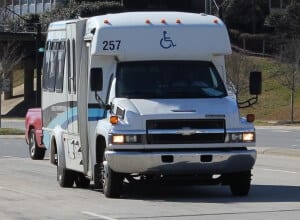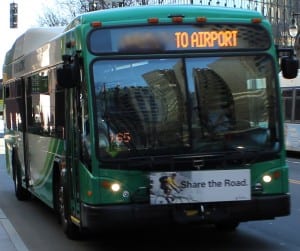Commercial Driver DWI Arrests | Charlotte DWI Attorney
Commercial Driver DWI Laws in North Carolina
Commercial truck drivers are the life blood of the country. Everything that matters moves by truck. It is what keeps food on the table and the economy going. Nevertheless, as any holder of a commercial drivers license (CDL) will tell you, the traffic and DWI laws are much stricter for semi-truck and other commercial vehicle drivers.
In North Carolina, there are actually three (3) different provisions specifically addressing alcohol and commercial drivers. Commercial driver DWI arrests are on the rise. NC has a virtual zero tolerance policy for any drinking in the cab. We will review each law, in relevant part, and then highlight what it actually means to drivers. Here are the laws with commentary:
§ 20-138.2. Impaired driving in commercial vehicle.
 A person commits the offense of impaired driving in a commercial motor vehicle if he drives a commercial motor vehicle upon any highway, any street, or any public vehicular area within the State while under the influence of an impairing substance; or after having consumed sufficient alcohol that he has, at any relevant time after the driving, an alcohol concentration of 0.04 or more; or with any amount of a Schedule I controlled substance or its metabolites in his blood or urine.
A person commits the offense of impaired driving in a commercial motor vehicle if he drives a commercial motor vehicle upon any highway, any street, or any public vehicular area within the State while under the influence of an impairing substance; or after having consumed sufficient alcohol that he has, at any relevant time after the driving, an alcohol concentration of 0.04 or more; or with any amount of a Schedule I controlled substance or its metabolites in his blood or urine.
The most noteworthy part of this commercial driver DWI law is the presumptive blood alcohol concentration (BAC) level is 0.04%, or half of the 0.08% standard for other drivers. Frankly, it is very easy to “blow” a 0.04% after only one beer. Also, ANY amount of a Schedule I controlled substance is sufficient for conviction. Despite ever changing federal and state laws regulating how often and how long a trucker can drive, many drivers still rely on prescription and other drugs to keep them awake and alert. We know it is dangerous, but that’s just the way trucking has been done for decades.
As a practical matter, there is still intense pressure by trucking companies to get the load delivered “on time.” Sadly, such practices result in serious truck accidents that kill and seriously injure families every year. Even if you stop taking such drugs, it will take days for all traces to leave your system and will still show up in urine or blood tests. Under this law, even if there is no contributing effect from a Schedule I substance, you will still be convicted if any amount is shown on testing.
§ 20-138.2A. Operating a commercial vehicle after consuming alcohol.
 A person commits the offense of operating a commercial motor vehicle after consuming alcohol if the person drives a commercial motor vehicle upon any highway, any street, or any public vehicular area within the State while consuming alcohol or while alcohol remains in the person’s body. An offense under this section is an implied-consent offense. The odor of an alcoholic beverage on the breath of the driver is insufficient evidence by itself to prove beyond a reasonable doubt that alcohol was remaining in the driver’s body in violation of this section unless the driver was offered an alcohol screening test or chemical analysis and refused to provide all required samples of breath or blood for analysis. This offense is a lesser included offense of impaired driving of a commercial vehicle under G.S. 20-138.2.
A person commits the offense of operating a commercial motor vehicle after consuming alcohol if the person drives a commercial motor vehicle upon any highway, any street, or any public vehicular area within the State while consuming alcohol or while alcohol remains in the person’s body. An offense under this section is an implied-consent offense. The odor of an alcoholic beverage on the breath of the driver is insufficient evidence by itself to prove beyond a reasonable doubt that alcohol was remaining in the driver’s body in violation of this section unless the driver was offered an alcohol screening test or chemical analysis and refused to provide all required samples of breath or blood for analysis. This offense is a lesser included offense of impaired driving of a commercial vehicle under G.S. 20-138.2.
We often tell clients that it is not illegal to drink alcohol and then drive. But, it is illegal to drink while driving. This law reinforces that rule. It is curious that the mere odor of alcohol is insufficient to prosecute a driver, but refusal to submit to any breath testing will be sufficient to convict. Just like impaired driving, this is also an implied consent charge. And, you can be charged with this offense in addition to DWI.
§ 20-138.2B. Operating a school bus, school activity bus, child care vehicle, ambulance, other EMS vehicle, firefighting vehicle, or law enforcement vehicle after consuming alcohol.
 A person commits the offense of operating a school bus, school activity bus, child care vehicle, ambulance, other emergency medical services vehicle, firefighting vehicle, or law enforcement vehicle after consuming alcohol if the person drives same upon any highway, any street, or any public vehicular area within the State while consuming alcohol or while alcohol remains in the person’s body. This section does not apply to law enforcement officers acting in the course of, and within the scope of, their official duties. An offense under this section is an implied-consent offense. The odor of an alcoholic beverage on the breath of the driver is insufficient evidence by itself to prove beyond a reasonable doubt that alcohol was remaining in the driver’s body in violation of this section unless the driver was offered an alcohol screening test or chemical analysis and refused to provide all required samples of breath or blood for analysis.
A person commits the offense of operating a school bus, school activity bus, child care vehicle, ambulance, other emergency medical services vehicle, firefighting vehicle, or law enforcement vehicle after consuming alcohol if the person drives same upon any highway, any street, or any public vehicular area within the State while consuming alcohol or while alcohol remains in the person’s body. This section does not apply to law enforcement officers acting in the course of, and within the scope of, their official duties. An offense under this section is an implied-consent offense. The odor of an alcoholic beverage on the breath of the driver is insufficient evidence by itself to prove beyond a reasonable doubt that alcohol was remaining in the driver’s body in violation of this section unless the driver was offered an alcohol screening test or chemical analysis and refused to provide all required samples of breath or blood for analysis.
It is amazing that such a law is required, but people with alcohol addiction issues don’t stop drinking on Monday morning when they go to work. Quite surprisingly, there are regular arrests made by drivers of vulnerable passengers, including school children, injured patients, and even police officers and firefighters. As with other alcohol in the system cases, the odor of alcohol alone is legally insufficient to prosecute, but any refusal of implied consent testing is enough to convict.
§ 20-138.2C. Possession of alcoholic beverages while operating a commercial motor vehicle.
 A person commits the offense of operating a commercial motor vehicle while possessing alcoholic beverages if the person drives a commercial motor vehicle upon any highway, any street, or any public vehicular area within the State while having an open or closed alcoholic beverage in the passenger area of the commercial motor vehicle. This section shall not apply to the driver of a commercial motor vehicle that is also an excursion passenger vehicle, a for-hire passenger vehicle, a common carrier of passengers, or a motor home, if the alcoholic beverage is in possession of a passenger or is in the passenger area of the vehicle.
A person commits the offense of operating a commercial motor vehicle while possessing alcoholic beverages if the person drives a commercial motor vehicle upon any highway, any street, or any public vehicular area within the State while having an open or closed alcoholic beverage in the passenger area of the commercial motor vehicle. This section shall not apply to the driver of a commercial motor vehicle that is also an excursion passenger vehicle, a for-hire passenger vehicle, a common carrier of passengers, or a motor home, if the alcoholic beverage is in possession of a passenger or is in the passenger area of the vehicle.
This law is basically the “open container” provision for commercial drivers. Just like you cannot have an open beer or mixed drink in a passenger car or truck, you cannot have a cold beer in the cab of a semi-truck or tractor-trailer. The law does make express exceptions for commercial passenger vehicles (bus, tour vehicles) and private motor homes as long as there is no open container beverage near the driver.
Although most of us think of tractor-trailer trucks when we hear the term commercial driver, there are many examples of commercial vehicles on the roads throughout the day. Even regular pickup trucks can become commercial vehicles if they meet the weight and use requirements. Sadly, there are many alcohol and/or drug dependent drivers out there putting us all at risk. Just because they go to work does not always mean they stop drinking or abusing drugs. Not everyone waits until 5:00 to start drinking. Because of the weight and inherent dangers their vehicles pose to the general public, the laws are necessarily stricter. And, of course, those drivers who transport passengers, patients, and school children are held to the highest standards of safety, as they should be.
